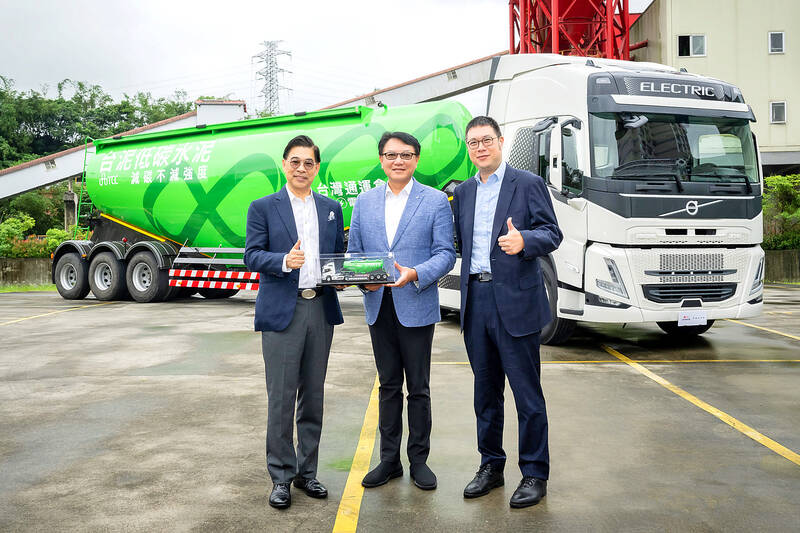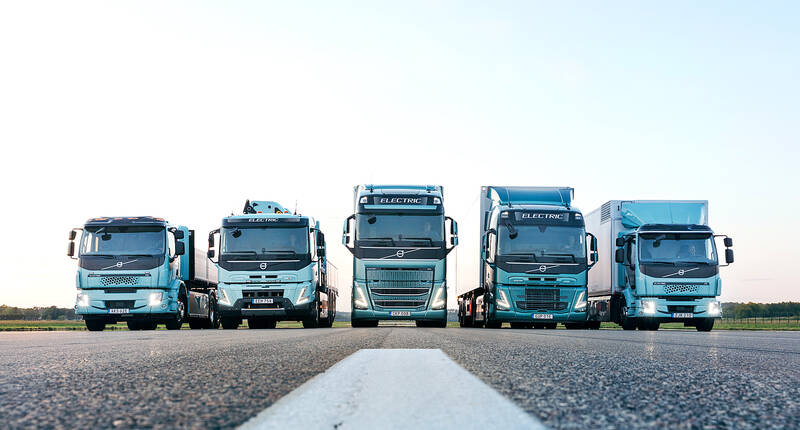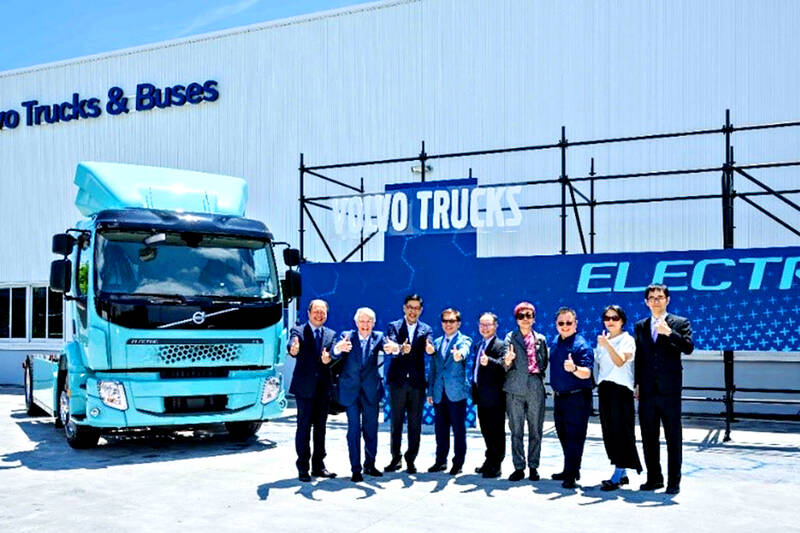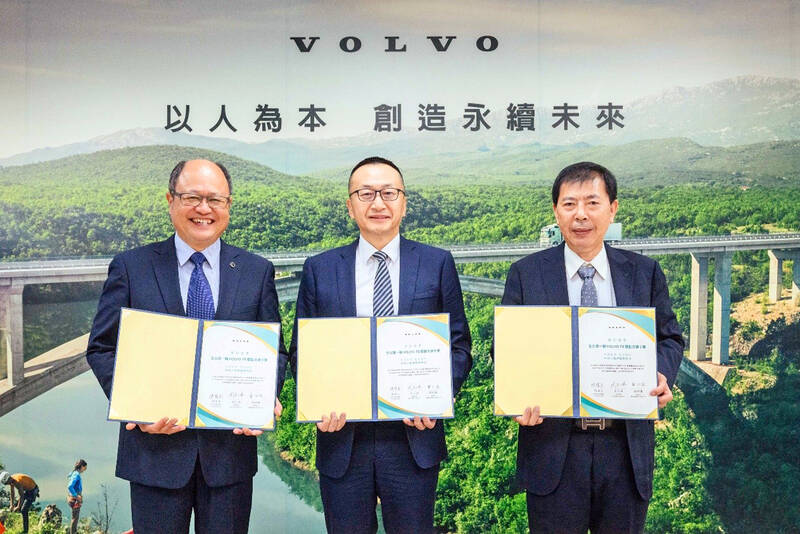Taiwan Cement Corp leads low-carbon revolution with Volvo electric trucks: Driving toward a greener future
Taiwan Transport and Storage Corp (台灣通運倉儲) purchased the first Volvo electric truck, an FME 43-tonne tractor, and held a delivery ceremony for the “Launch of Low Carbon EV Green Transportation” yesterday, making Taiwan Cement Corp (台灣水泥) the first company in Taiwan to adopt electric trucks to transport cement products and demonstrating its commitment to sustainable operations. Volvo electric trucks have great advantages in high-efficiency power, low emissions and ultra-quietness, and can satisfy the company’s sustainability goals.
Taiwan Transport and Storage Corp is to arrange for the two Volvo electric tractors to deliver bulk low-carbon cement. Combined with Taiwan Cement Corp’s green environmental engineering concept, carbon reduction and sustainability effects would achieve rapid growth.

After the successful delivery ceremony with Taiwan Transport and Storage Corp, Volvo Trucks will continue its efforts to promote green energy transportation in Taiwan.
Volvo Trucks’ electric trucks set sights on the world, laying the foundation for global sustainable transportation
As the UN released the Paris Climate Change Agreement, many countries have also made commitments and set goals for carbon reduction.

Facing the challenge of global climate change, Volvo Trucks has launched full range of low-emissions, low-noise level and environmentally-friendly electric trucks.
Since 2019, Volvo Trucks has successively launched 18.5 and 26-tonne FL Electric and FE electric trucks. Last year, Volvo officially commenced mass production of heavy-duty trucks, including tractors and rigid up to 43 tonnes, to meet various business applications for customers.
In recent years, Volvo Trucks has expanded worldwide, starting from Europe and North America, where nearly 6,000 electric trucks are sold in 42 countries around the world, and it continues to lead the market. Important economic centers in Asia, including Singapore, Taiwan, Hong Kong, Japan and Thailand are seeing growing demand for sustainable transportation.

With the introduction of next-generation batteries redefining industrial standards, the battery capacity has been increased by 42 percent. The DC charging technology can quickly recharge the capacity to 80 percent in 90 minutes and complete the charging process in less than two hours.
Volvo Trucks has also set clear goals for the brand. By 2030, carbon dioxide emissions from sold trucks shall be reduced by 50 percent, and by 2040, it shall be reduced by 100 percent. By 2050, Volvo Trucks population shall emit net-zero carbon dioxide emissions.
Taikoo introduces the full series of Volvo electric trucks to provide comprehensive transportation solutions

Taikoo Motors Group (太古汽車集團) has always supported and implemented the plans set by the Volvo brand. In 2023, the brand’s full series of electric vehicles, ranging from 18.5 to 43-tonne trucks and tractors, was introduced. In 2024, it would expand the product line again and introduce electric cement mixer trucks.
Taikoo also provides short, mid and long-term total solutions for EV transportation by building charging stations at its service centers across Taiwan and providing a professional service team to provide full after-sales support of electric vehicles.
Taikoo Motors is to continue to develop a comprehensive 360-degree sustainable ecosystem, collaborating with more strategic partners such as charging stations, energy storage equipment, insurance companies, and more. This aims to facilitate a smoother transition for customers from diesel truck to electric.
Cross-industry practice of ESG Volvo Trucks as the best partner to achieve net zero
Volvo’s electric trucks are now present in more than 40 countries, garnering support from renowned companies across various industries in Taiwan.
WRC Pacific, Ltd, a global leader in environmental protection, has acquired the first Volvo FE electric truck. Additionally, Zuellig Pharma, one of Asia’s largest healthcare service providers, has collaborated with Longfeng Pharmaceutical Logistics to introduce Taiwan’s first Volvo FE electric cold chain truck.
This initiative marks a significant step towards green logistics, showcasing the companies’ dedication to sustainable transportation. Recognized for their leadership in their respective fields, these companies are committed to achieving energy conservation and carbon reduction.
Volvo Trucks continues to lead in electric truck technology globally, advancing green energy and carbon reduction efforts. It remains a committed partner in supporting companies’ endeavors to implement environmental, social and governance strategies.

MULTIFACETED: A task force has analyzed possible scenarios and created responses to assist domestic industries in dealing with US tariffs, the economics minister said The Executive Yuan is tomorrow to announce countermeasures to US President Donald Trump’s planned reciprocal tariffs, although the details of the plan would not be made public until Monday next week, Minister of Economic Affairs J.W. Kuo (郭智輝) said yesterday. The Cabinet established an economic and trade task force in November last year to deal with US trade and tariff related issues, Kuo told reporters outside the legislature in Taipei. The task force has been analyzing and evaluating all kinds of scenarios to identify suitable responses and determine how best to assist domestic industries in managing the effects of Trump’s tariffs, he

TIGHT-LIPPED: UMC said it had no merger plans at the moment, after Nikkei Asia reported that the firm and GlobalFoundries were considering restarting merger talks United Microelectronics Corp (UMC, 聯電), the world’s No. 4 contract chipmaker, yesterday launched a new US$5 billion 12-inch chip factory in Singapore as part of its latest effort to diversify its manufacturing footprint amid growing geopolitical risks. The new factory, adjacent to UMC’s existing Singapore fab in the Pasir Res Wafer Fab Park, is scheduled to enter volume production next year, utilizing mature 22-nanometer and 28-nanometer process technologies, UMC said in a statement. The company plans to invest US$5 billion during the first phase of the new fab, which would have an installed capacity of 30,000 12-inch wafers per month, it said. The

Taiwan’s official purchasing managers’ index (PMI) last month rose 0.2 percentage points to 54.2, in a second consecutive month of expansion, thanks to front-loading demand intended to avoid potential US tariff hikes, the Chung-Hua Institution for Economic Research (CIER, 中華經濟研究院) said yesterday. While short-term demand appeared robust, uncertainties rose due to US President Donald Trump’s unpredictable trade policy, CIER president Lien Hsien-ming (連賢明) told a news conference in Taipei. Taiwan’s economy this year would be characterized by high-level fluctuations and the volatility would be wilder than most expect, Lien said Demand for electronics, particularly semiconductors, continues to benefit from US technology giants’ effort

‘SWASTICAR’: Tesla CEO Elon Musk’s close association with Donald Trump has prompted opponents to brand him a ‘Nazi’ and resulted in a dramatic drop in sales Demonstrators descended on Tesla Inc dealerships across the US, and in Europe and Canada on Saturday to protest company chief Elon Musk, who has amassed extraordinary power as a top adviser to US President Donald Trump. Waving signs with messages such as “Musk is stealing our money” and “Reclaim our country,” the protests largely took place peacefully following fiery episodes of vandalism on Tesla vehicles, dealerships and other facilities in recent weeks that US officials have denounced as terrorism. Hundreds rallied on Saturday outside the Tesla dealership in Manhattan. Some blasted Musk, the world’s richest man, while others demanded the shuttering of his